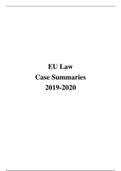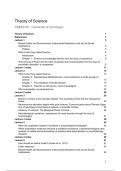Samenvatting
Summary European Law concise case summaries
- Instelling
- Rijksuniversiteit Groningen (RuG)
Comprehensive summary of all the cases from the reader in chronological order. Getting to grips with the case-law is, in my opinion, the hardest part of this course. Therefore, I spent a long time understanding the connections between the cases and the lectures given by the University which is visi...
[Meer zien]













